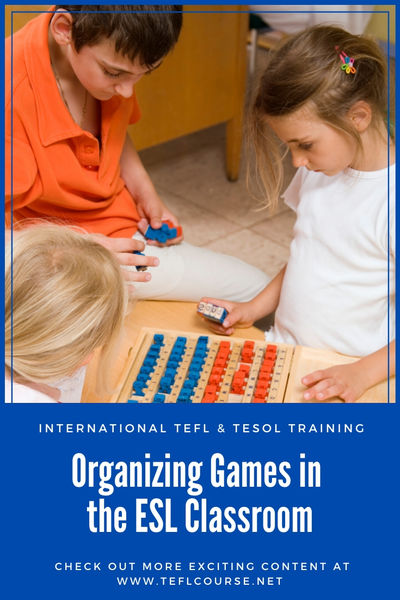Organizing Games in the ESL Classroom

Social, political and economic transformations in all areas of our society have led to significant changes in education as well. The status of a foreign language as a teaching subject has also changed. The state and society began to feel the need for people who practically speak a foreign language. In this regard, the foreign language within the secondary school has firmly taken the place of compulsory study, the teaching of which begins with the second grade for all students.
Table of Contents
Do you want to teach English abroad? Take a TEFL course!
This post was written by our TEFL certification graduate Anna O. Please note that this blog post might not necessarily represent the beliefs or opinions of ITTT.
Reasons to Implement Games
Teaching a foreign language at the initial stage is met with many difficulties along the way, as in most cases children are not yet familiar with the studied realities in their native language. Therefore, the task of the teacher in such a situation is to interest children in learning a foreign language and to make the learning session the most "easy to assimilate" for the child. The best form of schooling for primary school-age children plays, as at this stage of development the game is the main activity of the child.
The game is a special activity that blossoms in childhood and accompanies a person throughout his life. Many educators believe that at an early stage learning a foreign language is the most effective form of learning. With the help of the game, schoolchildren develop an interest in foreign-language communication, international, aesthetic education is carried out, a foreign-language information base (dictionary, speech cliches, phrases) is created, and speech mechanisms are formed.

Also Read: How much can I earn teaching English in the United Arab Emirates?
Benefits
The advantage of game methods and teaching techniques lies in the fact that they cause children to increase interest, positive emotions, help to focus on the educational task, which becomes not imposed from the outside, but a desirable, personal goal. They allow you to solve educational problems in an atmosphere of lightness, interest, and activity of children. In the situation of the game, the processes of perception, understanding, and assimilation take place in the child's mind more accurately and quickly.
Methodology
Game methods and techniques perform two main functions in a foreign language lesson. The first function is to improve and consolidate knowledge. At the same time, the child not only reproduces the knowledge in the form in which they were learned but transforms, transforms them, learns to operate them regardless of the game situation. The essence of the second function is that children learn both the knowledge and skills of different content at the same time.

Also Read: How does the combined TEFL course work?
Choice of Activities
There are different types of games. Each type of game involves the use of different game actions, that is, ways of showing the activity of the child for game purposes. The choice of game actions depends primarily on the age of children. Simple, similar actions are replaced by more complex, mentally demanding actions. But there is one pedagogical rule that should always be followed when organizing a didactic game: its developing effect directly depends on how diverse and meaningful the actions performed by the child. The more active action a child performs, the higher its educational and educational value.
Also Read: Can Americans teach English in Europe?
Rules
The rules provide successful implementation of game content for learning purposes. They make the game more democratic: they are subject to all participants of the game. That is, the training task determines the game actions, and the rules help to carry out game actions and solve the problem.
Do you want to teach English abroad? Take a TEFL course!
All of the above-mentioned things prove that the game is really an effective technique of learning English at the initial stage. Correctly selected by psychophysiological features and teaching task game techniques help to increase motivation to learn English, create a friendly atmosphere in the lesson, remove psychological language barrier, offering rather complex information in a simpler and more understandable form, contribute to the creation of a foreign-language information base and the formation of speech mechanisms and serve as a basis for the organization of various activities.
Apply now & get certified to teach english abroad!
Speak with an ITTT advisor today to put together your personal plan for teaching English abroad.
Send us an email or call us toll-free at 1-800-490-0531 to speak with an ITTT advisor today.
Related Articles:
- 10+ Activities For Teaching English Winter Camp
- Top 10 Things To Know When Moving Abroad To Teach English
- 7 Activities for Teaching Reported Speech in the ESL Classroom
- What TEFL course is most useful?
- Great Ideas for Teaching Listening Skills in the ESL Classroom
- The Best Countries to Teach ESL When You're 50+




